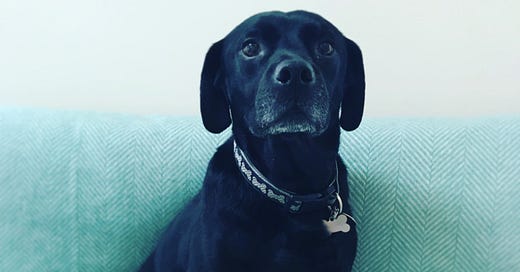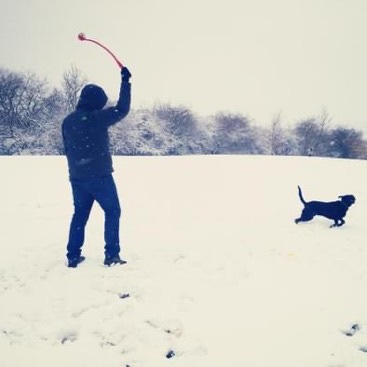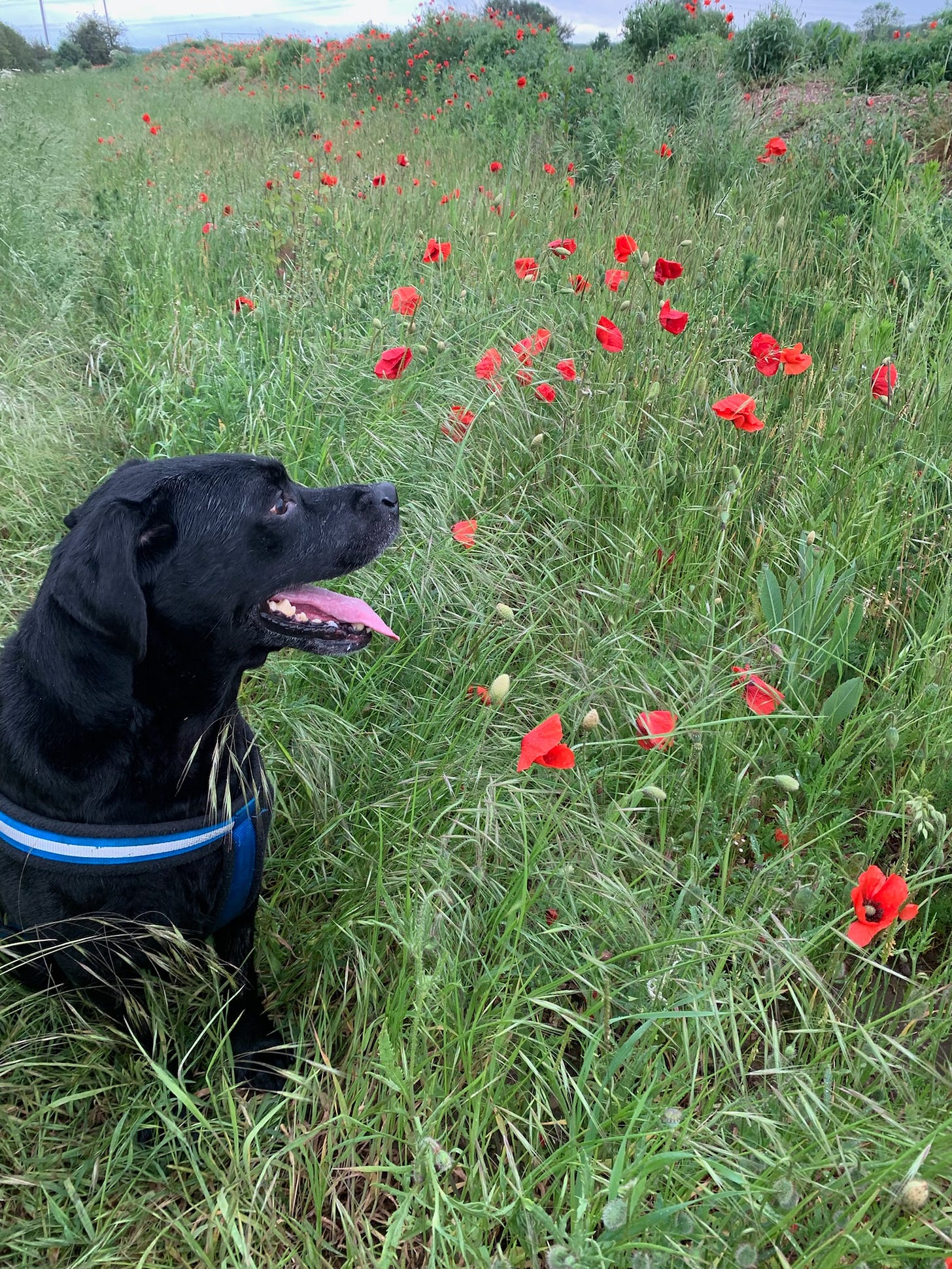This blog started off life as a response to Kathleen Waller over at the Matterhorn, (if you haven’t subscribed to Kathleen’s writing you are missing out!) she was posing a question about memory, identify and AI back in April, naturally my writing and first draft has changed shape since. A seismic shift took place when we lost our beloved 14 year old dog Sam which has made me think about the memories we hold close, and the way in which memory helps us to socialise and process grief with others, amongst other things.
Our grief was shared when I announced Sam’s death on our social media channels, a departure from my mostly private online nature, most of my social connections were probably unaware I had a dog, but I welcomed the social solidarity with other pet owners. It was important to mark that day. I shared photos with our family and my best friends, our experience of his death was aided by technology in a very modern and cultural way through Whatsaap. When we find ways to reminisce and meaning- make, according to Riches & Dawes (1998) it helps us maintain a personal and social bond with our loss.
There was a long period where we expected Sam’s loss and the grief that would follow, even though we didn’t know what it would exactly feel like. This four-legged family member was old with poor eyesight, selective hearing, arthritic legs and hips, failing kidneys, smelly breath and almost completely incontinent, he was a huge part of daily lives, our last summer with him was one of caretaking. Staying up late, rising early, pushing him gently (as gently as you can push and old stubborn 20kg dog) outside multiple times a day for the toilet.
Our grief has descended in sudden silence, the memory of hearing the clickety-clack of his claws against the floor or the sound of his grizzly snoring as he lay sprawled on the sofa, and the unique jingle of his collar that I hadn’t realised was the soundtrack to our daily life. I can conjure up these sounds as clearly as if they had just happened. I wonder how long I will remember these sounds exactly, psychologically speaking memories are thought of as decaying and vulnerable to interference, there’s a sense that my treasured memories of Sam are now vulnerable now that he is no longer here, that I need to find a way to keep those memories alive.
For us psychologists, memory is as much about forgetting as remembering, of course, it is impossible for us to process and commit every single bit of sight, and sound and touch to our memory. The mechanics and the way in which we remember or encode information is still largely unknown, but the clues around how we remember are found in the way we forget.
But interestingly memory isn’t recorded factually in our brains like a tape recorder or even linearly as a computer would store fragments of sounds, although this was one popular memory model which relied on repetition and rehearsal of information to ensure the memory would not be forgotten or vulnerable to forgetting. Instead, we now think that our memories are an ongoing interpretation and convergence of processing, a process of consolidation, and they can be just as vulnerable in the long term to memory decay, in a process called deconstruction.
Another reason we do not have tape recorder type memory recall is that some autobiographical events are more salient, intriguingly it’s why we experience reminiscence bumps, more memories are stored in our early adulthood so we remember these events more fondly, more often. One theory the Cognitive explanatory account (Rubin et al, 1998) states that we have more novel experiences that require deeper encoding during this time which helps with the saliency. Researchers have also suggested that the development of our personal identity through adolescence known as identity-formation, or narrative account theories (Fitzgerald 1988) has a bearing on a phenomenon called the reminiscence bump.
Some researchers have found the ages 10-30 result in an increase in memories, this has been one explanation as to our preference for favourite books, especially as early adulthood is for many people a time where reading is mandated in school settings, and why the 90’s were the best decade for music, if you ask me. So as well as the recency effect (memories in our recent past up to 5 years) being an indicator of how well we recall memories, when that memory was encoded (or stored) appears to matters too.
Interestingly, just as I was about to hit publish on this blog an article was shared that found YouTube comments on music videos from more recent decades are more likely to convey feelings of nostalgia compared to comments on videos from earlier decades. We have no way of knowing the age profile of people leaving those comments but it does add to the debate on the reminiscence phenomenon! more here
Sam joined our family when I was past adolescence and so I’ll turn to another theory, the cultural life-script account (Bernstein & Rubin 2002) that describes the way we retrieve autobiographical memories aligned to major positive life events such as getting married, and childbirth. These events happened to us in our thirties, this might apply to any Sam reminiscence bumps we might experience in the future, or how our positive experience of Sam is folded into our life-story (Gluck & Bluck 2007). When we worked it out statistically, Sam had been with us for a third of our lives, and been by our side through many major life events. I cannot think about him without thinking about the mini Sam we had made as a topper for our wedding cake, or the birth of our child and apprehensively introducing them. A key part of remembering is the associations of incoming memories with stored information, daily habits and rituals are one way in which psychologists have explored memory strength and quality.
Our grief is punctuated through daily rituals, Sam had lived with us in three properties over 13 years. Different rituals for different spaces and phases of his life, in our first family home we would have to leap up before he noticed visitors to shut him into the Kitchen so we could open the door into our narrow hallway without them being bowled over by an enthusiastic and loudly barking Labrador. In our second home he would bark at random, at cars or people that passed by the living room window but most loudly (we concluded) when our baby was sleeping. He would also like to shake his muddy self enthusiastically against the cream walls of the entrance hall in our second house. We repainted regularly.
In our final home, he barked less, because he heard less, and often he would stagger disorientated from a deep sleep into the kitchen to find a Tesco delivery driver stood there, and in comedic fashion he’d give a few grumble barks to alert us to the intruder then happily succumb to a head rub. He was a terrible guard dog in his old age.
Yesterday’s ritual reminder was realising I’d made up ‘extra’ gravy for Sunday dinner, and in the process of being in the kitchen I’d not tripped over him as he hovered slowly for scraps on his arthritic legs.
Our grief weaves itself through nostalgia, the marathon training partner who would always be eager to head out at 6am for a run no matter the weather. Winter running with a black dog in the dark had it’s hazards though, the poor thing was trussed up in a flashing collars, I looked like I was running with a ghostly floating dog head on autumn evenings.
When we adopted Sam as an energetic 18-month-old dog he would often break or topple items within a swipe’s length of his wagging tail, earning him the grand title ‘Sir-wags-a-lot’. Annoyingly he would create an Olympic sized pool of drool if he was near a Pizza, which was disgusting to look at and clean up. We used to joke that he would stage kibble protests by scattering his dog food across the floor if he thought there would be a chance of something from our meal. Forget stepping on lego on the stairs, standing on saliva covered kibble with bare feet is the ‘worst’ when it sticks to your feet like glue.
It’s thought that these complex feelings that nostalgic memories evoke help us to emotionally repair, and it’s all down to the mechanism of nostalgia in which we reassemble and construct our past to filter or smooth out the uncomfortable bits, we are trying to create a favourable version of events, rose-tinting has a psychological function that enables us to see our lives in a more meaningful way.
Our grief memory is incomplete though, largely we remember what we see, or what is passed into our memory, psychologist’s think of it like a collage or a fusion of the last 15 seconds of visual information that creates a stable environment, a smoothing effect if you like. This is where clever technology finds space to plug gaps in our memory. It’s as easy as typing ‘dog’ into apple photos on my phone, hundreds of forgotten images are returned of him in fields with tennis balls, covered in mud, hopping through snow, looking quizzically at a new-born child, ignoring a toddler, snoring on a sofa, and many more blurred photos where is zooming around. There is also the psychological idea that optimism bias leads us to pay more attention to the good times, in fact we recall happy events more than sad (see my earlier blog ‘Have you been moved to tears’ for more on the emotion side). It is entirely possible there is a back catalogue of bad memories, slobber aside, that I have subconsciously forgotten because they are not appealing, and I am guessing that you do not want me to nostalgically recall any dog poo incidents of which there were many in recent months.
We are selective about the memories we hold and share in different circumstances, and it makes me think about the vague memories I have about Sam, and how I might preserve them. How I have selected the memories to share with you here, to frame the impact he had and the loss we’ve experienced.
‘Can I handle the seasons of my life’ Landslide, Fleetwood Mac.
Our grief is an irrevocable realisation that our identity has shifted, we are no longer (or temporarily we are not) dog owners, our choice for the next chapter because we have ideas about being spontaneous now that our dog caring responsibility is lifted. Our first born has gone, we are a family of three not four. I will be saying, ‘we had a black Labrador called Sam’ to another dog owner, instead of ‘we have a dog too!’, dogs are recognised as social facilitators providing an opportunity to speak with strangers without the awkwardness, I will miss that.
Sam’s membership in our family silently signalled our place in the world to others, studies show that our furry friends, or, more scientifically, companion animals, have a positive effect on our social identity, people see pet owners as more sociable, content and easygoing. It is worrying that I might have to try harder going forwards, another adjustment to our life without Sam, like many pet owners he was a person to us, he was a great listener. We spoke to him. I miss our daily salutations of ‘Morning Sam dog’, as he stretched and yawned.
And his loss feels like another life milestone that I must handle in one way or another, layered on top of the always changing shape of motherhood, the upheaval and transition to menopause … I now have the intangible weight of nostalgic grief wrapped around me like a blanket.
It is profound that we find ourselves gradually in a silent new chapter to coincide with a new season, psychologically speaking, knowing that this temporal marker of Sam’s death is going to sit side by side with the end of summer for many years to come feels strange, I love this season the most. I’m thinking about how our acer tree is turning from one shade of red to another, and I should also be thinking about changing the batteries in Sam’s flashing collar.
He was a very good boy.
p.s for me, there is a key distinction between AI retrieval, which re-creates from digital references, and human memory retrieval, which is never an exact recreation of events that happened and susceptible to forgetting and deconstruction. Our memory is always changing and malleable as we process emotions and events.








What a beautiful tribute to sweet Sam. That last line - though so simple - really got me.
The social media space for grief is an interesting one - I think it can offer a way to share in a protected way and try to share what yiur (subjective/changing) memory feels rather than just sees. I guess I think a lot of the personal va collective and the way sharing in this way makes your grief a part of the collective memory to some extent. I think of this today, too, because I’m seeing some compelling posts of people’s experiences on 9-11.
Thank you for such a thought provoking post in the midst of your own grief. And thank you for your memory collaboration and the kind words at the start of your article. 💙
This is such a beautiful tribute to your well loved Sam. Thank you for sharing Sam and your love with us. The world needs so much more of this right now. I needed this right now. You painted such beautiful pictures for us with your words. xx